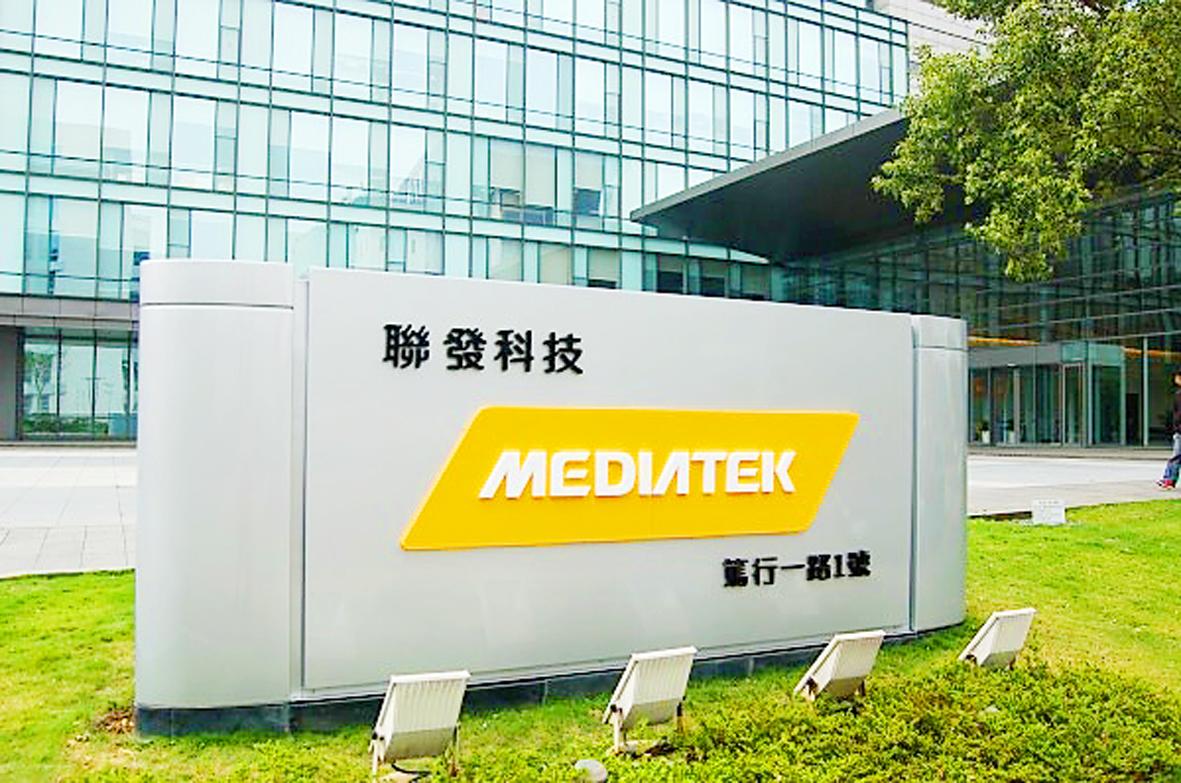The data transmission speed of 6G (sixth-generation wireless) networks is expected to be 10 to 100 times faster than 5G technology, MediaTek Inc (聯發科) said in a paper released on Jan. 18.
6G standardization is expected to begin in 2024 or 2025, with the first standard technology expected in 2027 or 2028, said MediaTek, one of the world’s leading chip design companies.
“Our 6G vision is of an adaptive, integrated and super heterogeneous wireless communication system, delivering pervasive mobile connectivity in a truly ubiquitous manner,” the paper said.

Photo: Grace Hung, Taipei Times
The sector is making breakthroughs in the research and development (R&D) of key 6G technologies, said Fan Ming-xi (范明熙), deputy general manager of MediaTek’s communication system design department.
MediaTek is bolstering its 6G R&D and is working with top-end researchers in academia and industry to explore innovative technology trends, Fan said.
In addition to several new technologies, such as ultra-wideband receiver and transmitter technology, the convergence of terrestrial and non-terrestrial networks, artificial intelligence, and machine learning for networking and communications could lead to more innovative and emerging technologies being introduced over the next few years, Fan added.
The standardization and rollout of 6G technology would follow the timeline set out in the International Telecommunication Union Radiocommunication Sector’s International Mobile Telecommunications vision for 2030 and beyond, MediaTek said.
The company expects initial standardization efforts to start next year or in 2024.
It said it would continue to develop 5G technology to help push the standardization and commercialization of 6G systems.
MediaTek also outlined new “killer applications” for 6G technology, saying these would drive the need for higher performance, such as extreme holographic and tactile communications, digital twins and advanced telepresence.
MediaTek said that 6G technology could cause data transmission speeds to rise by a factor of 10 to 100, with guaranteed low latency relative to 5G, and provide additional spectrum availability in the 7 to 24 gigahertz and sub-terahertz frequencies, with total addressable bandwidth of 50 gigahertz.
The new spectrum opens up significant opportunities to deliver “extreme applications,” but also creates significant challenges, such as overcoming poor propagation at higher frequencies, the paper said.

South Korea’s equity benchmark yesterday crossed a new milestone just a month after surpassing the once-unthinkable 5,000 mark as surging global memory demand powers the country’s biggest chipmakers. The KOSPI advanced as much as 2.6 percent to a record 6,123, with Samsung Electronics Co and SK Hynix Inc each gaining more than 2 percent. With the benchmark now up 45 percent this year, South Korea’s stock market capitalization has also moved past France’s, following last month’s overtaking of Germany’s. Long overlooked by foreign funds, despite being undervalued, South Korean stocks have now emerged as clear winners in the global market. The so-called “artificial intelligence

NEW IDENTITY: Known for its software, India has expanded into hardware, with its semiconductor industry growing from US$38bn in 2023 to US$45bn to US$50bn India on Saturday inaugurated its first semiconductor assembly and test facility, a milestone in the government’s push to reduce dependence on foreign chipmakers and stake a claim in a sector dominated by China. Indian Prime Minister Narendra Modi opened US firm Micron Technology Inc’s semiconductor assembly, test and packaging unit in his home state of Gujarat, hailing the “dawn of a new era” for India’s technology ambitions. “When young Indians look back in the future, they will see this decade as the turning point in our tech future,” Modi told the event, which was broadcast on his YouTube channel. The plant would convert

‘SEISMIC SHIFT’: The researcher forecast there would be about 1.1 billion mobile shipments this year, down from 1.26 billion the prior year and erasing years of gains The global smartphone market is expected to contract 12.9 percent this year due to the unprecedented memorychip shortage, marking “a crisis like no other,” researcher International Data Corp (IDC) said. The new forecast, a dramatic revision down from earlier estimates, gives the latest accounting of the ongoing memory crunch that is affecting every corner of the electronics industry. The demand for advanced memory to power artificial intelligence (AI) tasks has drained global supply until well into next year and jeopardizes the business model of many smartphone makers. IDC forecast about 1.1 billion mobile shipments this year, down from 1.26 billion the prior

People stand in a Pokemon store in Tokyo on Thursday. One of the world highest-grossing franchises is celebrated its 30th anniversary yesterday.